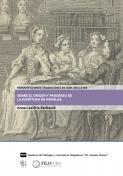
Desde la cátedra de Literatura del Siglo XIX, en el marco del curso "Novela y novelas en el siglo XIX: 1770-1850" (UBA.Filo), tenemos el gusto de invitarles a la presentación de la primera traducción al español de "Sobre el origen y el progreso de la escritura de novelas", de Anna Laetitia Barbauld, con traducción, notas y estudio preliminar de Jésica Lenga (UBA-UNAJ-CONICET).
El evento se realizará en el aula 201 del Anexo Bonifacio de la sede Puan de la Facultad de Filosofía y Letras de la UBA, mañana martes 19 de agosto, de 12:30 a 14 horas. El libro, gentileza de la universidad pública para el mundo, se puede descargar aquí.
Tendremos en la presentación, directo desde Exeter, a Jane Spencer, una de las más destacadas estudiosas de la mujer novelista en el siglo XVIII. Su obra al respecto, del año 1986, se titula, en contrapunto con la obra de Watt, The Rise of the Woman Novelist (puede leerse aquí).
Y nos hablarán del libro de Barbauld-Lenga, de los estudios de género y de la autora María Vicens (UBA-Conicet), Carolina Ramallo (UBA-UNAHUR) y la propia Lenga.
El libro
"Sobre el origen y el progreso de la escritura de novelas" es un importante ensayo sobre el género publicado en 1810 como introducción a una colección de 28 novelas inglesas editadas en 50 tomos (de las 28, 13 son de autoras). Lenga no solo tradujo a Barbauld; también anotó minuciosamente la traducción (solo leyendo las notas al pie une lectore puede hacer un curso acelerado por varios siglos de novelística) y compuso un estudio preliminar con extensión de libro en el que no solo nos habla de este texto sino de la figura intelectual de Barbauld y del vínculo (complejo, lleno de violencias, que es preciso conocer) entre novela y mujeres escritoras en los 120 años que proceden a "Sobre el origen". Más allá de la cuestión de la novela, para quienes se interesen por entender con conocimiento de causa y precisión histórica el modo en que la enorme producción femenina del siglo XVIII fue reducida a un canon de obras de varones, leer esta obra es un excelente comienzo.
El libro es digital y sale como el número 3 de la colección Romanticismos Traducidos de la Sección de Literaturas Extranjeras del Instituto de Filología y Literaturas Hispánicas Dr. Amado Alonso. Esta colección aspira a renovar la mirada sobre las literaturas en lenguas no hispánicas del período romántico con traducciones inéditas o revisadas, todas editadas críticamente, para interrogar e iluminar el fenómeno desde la investigación propia.
La entrada es libre y gratuita, hasta colmar capacidad. También puede verse por el canal de Youtube de la cátedra Literatura del Siglo XIX - YouTube.
English version
From the Chair of 19th Century Literature, as part of the course 'Novel and Novels in the 19th Century: 1770-1850,' we are pleased to invite you to the presentation of the first Spanish translation of 'On the Origin and Progress of Novel Writing' by Anna Laetitia Barbauld, with translation, notes, and preliminary study by Jesica Lenga.
The event will take place in Room 201 of the Bonifacio Annex of the Puan building of the Faculty of Philosophy and Letters of the University of Buenos Aires from 12:30 to 2:00 p.m. The book, courtesy of the public university for the world, can be downloaded here.
The presentation will feature Jane Spencer, one of the most prominent scholars of women novelists in the 18th century, live from Exeter. Her 1986 work on the subject, in strict counterpoint to Watt's work, is titled The Rise of the Woman Novelist, and it can be read here.
And we will hear about the book, gender studies and the author from María Vicens (UBA-Conicet), Carolina Ramallo (UBA-UNAHUR) and Jesica Lenga herself (UBA-UNAJ-CONICET).
'On the Origin and Progress of Novel Writing' is an important essay on the genre published in 1810 as an introduction to a collection of 28 English novels published in 50 volumes (of the 28, 13 are by female authors). Lenga not only translated Barbauld; she also meticulously annotated the translation (just by reading the footnotes, a reader can take a fast-track course through several centuries of novel writing) and composed a preliminary study the length of a book in which he not only talks about this text but also about the intellectual figure of Barbauld and the link (complex, full of violence) between the novel and women writers in the 130 years preceding 'On the Origin'. Beyond the question of the novel, for those interested in understanding with historical knowledge and precision how the enormous female output of the 18th century was reduced to a canon of works by men, reading this work is an excellent start.
The book is digital and is published as number 3 in the Romanticismos Traducidos collection of the Foreign Literature Section of the Dr. Amado Alonso Institute of Philology and Hispanic Literatures. This collection aims to renew the view of non-Hispanic literature from the Romantic period with unpublished or revised translations into Spanish, all critically edited, in order to question and shed light on the phenomenon from our own research.
Admission is free, subject to capacity. It can also be viewed on the YouTube channel of the Chair of Literatura del Siglo XIX - YouTube.
